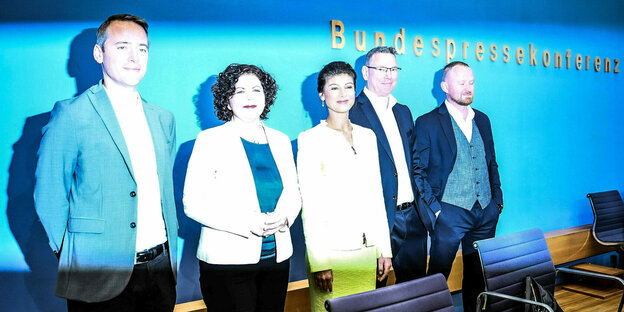Is the Sahra Wagenknecht Alliance (BSW) a midlife crisis party? At least so far, it mainly reaches people over 45, according to political scientist Kai Arzheimer.

From Life Crisis to BSW: Is the Sarah Wagenknecht Alliance a Midlife Crisis Phenomenon? Photo: Reto Klar/imago
taz: Mr. Arzheimer, Sahra Wagenknecht and their colleagues with whom he founded his new party are in their 40s and 50s. Is the BSW a party of politicians in mid-life crisis?
Kai Arzheimer: These are mostly people who have been active on the left for a long time, including many members of the former Bundestag parliamentary group. No wonder they are a little older; In reality, young people do not access the Bundestag so easily. That explains the age distribution.
Kai Arzheimer is a political scientist and university professor at the Johannes Gutenberg University in Mainz.
The desire to start over when you are older is a typical symptom of a midlife crisis. It does not matter?
It is true that Wagenknecht has been in politics for a long time, since the 90s. But that is the autobiographical explanation. I prefer the structural explanation: a wing of the Left Party leadership had a different idea of what the party should be. But he couldn't get his way and that's why they broke up.
Does the new Sahra Wagenknecht alliance have a chance?
In terms of content, it fills a void. So far there has been no offer for those who would like to see stronger social and economic redistribution combined with a more regressive course of social and cultural policy. Sahra Wagenknecht fills this gap and on the second attempt she is now much better prepared organizationally than she was when she started her “Get Up” collecting movement five years ago.
Who does BSW attract?
These are mainly people from the lower middle class, traditional skilled workers and all those who want traditional social democratic policies – that is, more state, higher taxes and better social benefits – and at the same time reject a social policy that, in their eyes , focuses too much on minorities and culture and immigration. What goes against BSW is that these people are probably already voting for the AfD.
What is the difference between BSW and AfD?
One difference is the style. The AfD has become increasingly aggressive over the years.
Sahra Wagenknecht talks about “crazy traffic lights” and the “stupidest government in Europe”… isn't that aggressive?
This is classic populism that says: The elites have failed and are not acting in the interest of the people. But the AfD has become very radicalized when it comes to migration. The Sahra Wagenknecht alliance is currently very far from that. In the BSW programme, the topic only appears at the end and is formulated in the same way as it can be found in the CDU or parts of the SPD. What is interesting in this context are the recent statements that, if the content fits, a vote with the AfD in the Bundestag can be imagined. This is so far a symbolic statement. But it shows that you don't exclude anything and don't participate in the firewall.
Where are there overlaps between AfD and BSW?
When it comes to military support for Ukraine and climate protection: decarbonization goes too far, he says. We must support traditional German industries, especially the automobile industry.
At the party conference in Berlin the audience was older; the star was Oskar Lafontaine, 80 years old. Does the Sahra Wagenknecht alliance primarily attract older people?
It is addressed to people who have distanced themselves from politics since Gerhard Schröder and who believe that this should not have happened. In terms of total population, this is a small group, so you won't win elections. That is why the BSW aims at the middle of society. So far it has mainly reached people aged 45 and older.
Wagenknecht wants to focus the election campaign on the issue of pensions. Is this a good idea?
Ideally, it should also appeal to younger people. But this could prove difficult, because some of them are interested in the socio-political issues that the BSW rejects. Whether BSW can inspire younger people probably depends on their social situation. But if it manages to establish itself, they will surely also be able to attract younger voters, perhaps people with lower educational qualifications.
